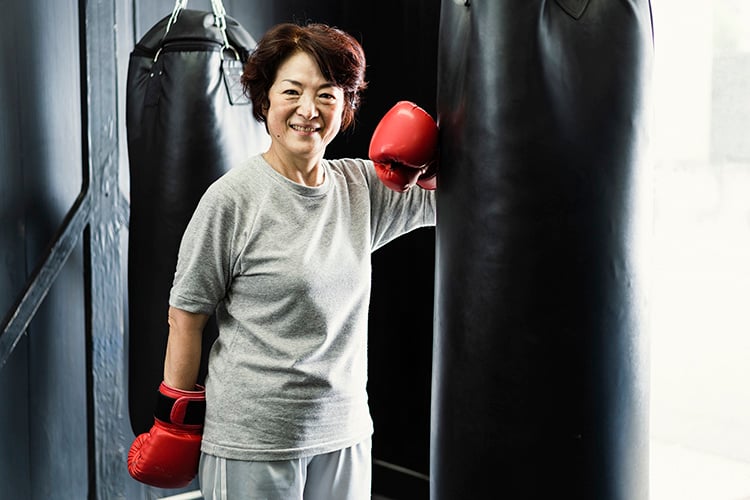
Fighting Parkinson's One Punch at a Time
Health & Aging | Pine Run Village
Updated from the original publication on April 18, 2024.
At 87, Marty, a disabled Air Force veteran, was wheelchair bound. Parkinson’s disease had robbed him of his ability to move freely. Then he discovered Rock Steady Boxing, a program available at Presbyterian Senior Living’s Pine Run Village in Doylestown, Pa.
Under the direction of Kristin McCoach, Fitness Director and the Rock Steady Boxing Head Coach at Pine Run Village, Marty began the rigors of the intense exercise program.
“She has taken me from a wheelchair-bound person to being able to box and exercise,” he says.
Rock Steady Boxing is striking a blow for individuals with Parkinson’s disease and reshaping what it means to live with what can be a debilitating condition.
The genesis of a movement
Kristin, who has spent her career in the world of senior fitness, encountered Rock Steady Boxing in 2018 while working at a YMCA. At first, the idea of using boxing to help those with Parkinson’s worried her.
“I had worked with people with Parkinson’s, but it was a different mindset then: Just be very careful,” she says.
After giving it a try and connecting with individuals who were stepping out of their comfort zone and into the program, she embraced its potential. When Kristin returned to work at Pine Run, Kevin Mallon, Corporate Director of Thrive Wellness at Presbyterian Senior Living, encouraged her to establish a Rock Steady Boxing program.
“It’s a little gritty, it’s a little dirty, but it’s been fantastic,” Kristin says.
Class participant Aaron agrees. “The Rock Steady Boxing program is unique. It not only helps us to maintain balance and coordination, it helps us to build confidence in ourselves,” he says. “It shows us all we can do and encourages us to do more. We are a team, fighting together, led by Kristin, to overcome the challenges we face."
Inside a Rock Steady Boxing class
 Rock Steady Boxing doesn’t offer just physical exercise; it’s a movement in which participants find understanding, good fellowship, and empowerment. They engage in intense movements, including boxing drills, agility exercises, and core-strengthening routines, all designed to challenge them physically and mentally. The results are tangible: improved mobility, balance, and confidence that extend far beyond the sport of boxing.
Rock Steady Boxing doesn’t offer just physical exercise; it’s a movement in which participants find understanding, good fellowship, and empowerment. They engage in intense movements, including boxing drills, agility exercises, and core-strengthening routines, all designed to challenge them physically and mentally. The results are tangible: improved mobility, balance, and confidence that extend far beyond the sport of boxing.
“It’s not so much what it looks like. It’s the feeling,” Kristin says. “It’s the feeling you get being in a room where if you start shaking, people understand. If it takes a few minutes to get a word out, people understand. We train them as if they’re going to get in the ring, but it’s non-contact.”
Ed and Marie experienced that firsthand when Ed started participating in the program.
“It's been about 7 months and the positive change in Ed is amazing,” Marie says. “He looks forward to going to class, seeing the people he's met there and exercising.”
Anchored in research
 Multiple scientific studies have demonstrated the value of intense exercise for individuals with Parkinson’s. While the disease has no cure, in one study published by Nature Partner Journals, researchers found that heavy exercise increases dopamine levels in parts of the brain affected by Parkinson’s. Dopamine is a chemical that helps with movement and often is reduced in Parkinson’s patients. By increasing the levels, participants are able to maintain their mobility longer.
Multiple scientific studies have demonstrated the value of intense exercise for individuals with Parkinson’s. While the disease has no cure, in one study published by Nature Partner Journals, researchers found that heavy exercise increases dopamine levels in parts of the brain affected by Parkinson’s. Dopamine is a chemical that helps with movement and often is reduced in Parkinson’s patients. By increasing the levels, participants are able to maintain their mobility longer.
In another study that surveyed nearly 2,000 individuals, 70% of those with Parkinson’s who participated in Rock Steady Boxing reported improved quality of life. Beyond the physical benefits, they noted anxiety relief, camaraderie, and the feeling that they were able to maintain a sense of identity.
“Rock Stead Boxing is an intense workout that challenges you both physically and mentally, but the true secret of the program is the fellowship and community that evolves effortlessly in the class,” says Bill, a class participant.
Expanding the reach
As awareness of Rock Steady Boxing grows, so does its potential to impact individuals beyond Pine Run Village. Kevin and Kristin have established multiple smaller classes and envision further expanding the program, which is open to those in the greater Doylestown area.
For Amy, the class has set itself apart from other exercise endeavors she’s been involved with.
“At age 65, I have taken a lot of exercise classes. Rock Steady Boxing is the first program that I have stuck with for more than a month or two. I am now in my second year of Rock Steady Boxing and look forward to going every week,” she says. “Kristin never repeats a workout, so the classes are motivating, challenging, and certainly never boring. In addition to providing stimulating exercises, I met other Parkinson’s patients at various stages of Parkinson’s disease and we have formed a very strong bond and support and encourage one another, both in boxing and in life.”
Currently, the class is open to both Pine Run residents and the broader community. Kevin and Kristin’s goal is to provide support and empowerment to as many individuals as possible as they learn to live with Parkinson's.
For those grappling with a Parkinson’s diagnosis, Kristin encourages them to seek out a movement disorder specialist, build a supportive care team, and prioritize exercise.
“Don’t just sit down,” she says. “Get up, start moving.”
Kevin echoes this sentiment, urging those with Parkinson’s to embrace a mindset of resilience and purpose.
“Fight back,” he says.
Rock Steady Boxing is more than just a fitness program; it’s a spark of hope for those trying to reclaim their lives from Parkinson’s. By empowering them to fight back against their condition, Rock Steady Boxing is changing what it means to live with the disease.
About Presbyterian Senior Living
As the trusted leader in aging services, Presbyterian Senior Living combines over 97 years of experience with innovative approaches to senior communities and services. Across our 27 communities in PA, MD, OH, and DE, we serve over 6,000 seniors. We are committed to: FOSTERING teamwork and responsibility. UPHOLDING integrity in every action. EMBRACING innovation to create opportunities for everyone’s success. LEADING with compassion and respect.


